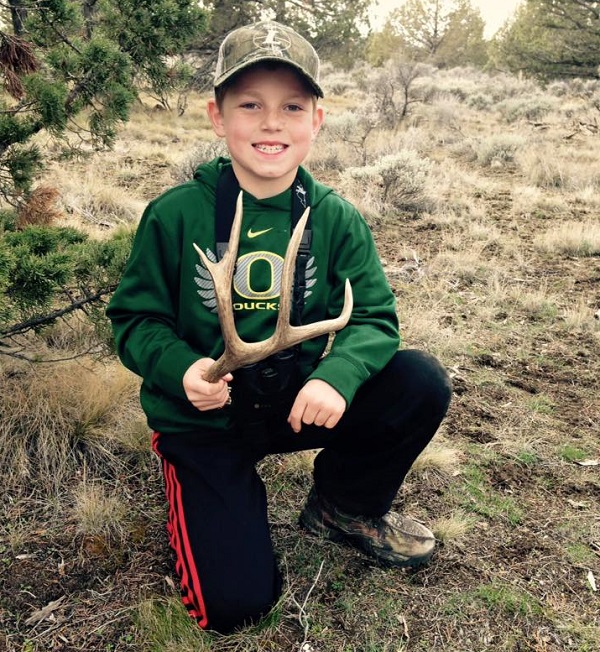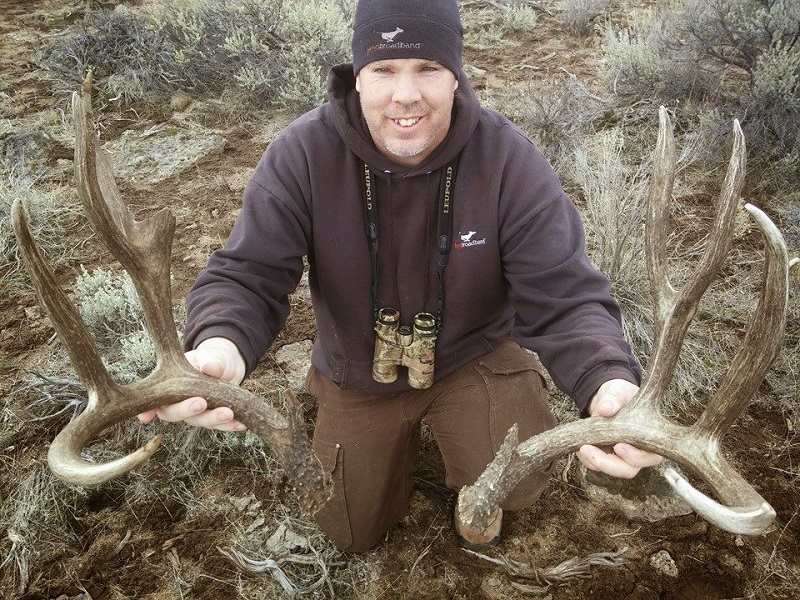
Severe winter makes responsible shed hunting critical

by ODFW
3-1-2017
Website
As weather breaks and snow begins melting at lower elevations, more hunters are expected to take to Oregon’s outdoors—not for the chance to harvest a deer or elk but to look for their shed antlers. (Oregon’s buck deer shed their antlers from late December through March and bull elk shed them from late February through early April.)
But one prominent member of the sport is recommending shed hunters delay their search awhile longer.
“I’ve lived here in central Oregon for almost 20 years. We’ve had some big snow years but this is the longest time I’ve seen snow consistently on the ground—since Thanksgiving,” says Rob Tanner, co-founder of Oregon Shed Hunters, an organization devoted to education about ethical shed hunting. “It’s making it difficult for wildlife to get around, especially deer.”
Tanner admits it’s tempting to go out now, especially because severe winters can congregate deer and elk and make for prime shed hunting. “It’s easy to think since there is not a lot of snow now that the critters are fine, but that’s not necessarily the case,” he added. “They are still burning winter reserves and aren’t ready for people to be pushing them around.”
Tanner recommends delaying shed hunting until later in spring. The organization has even pushed its annual Group Shed Hunt back a few weeks until late March. “If we want to preserve our shed hunting ways we need to make every effort possible to be ethical,” says Tanner. “Utah has closed the entire state to shed hunting this year because of the hard winter. If we don’t want regulations like that for Oregon, it’s important that we all practice ethical shed hunting.”
While Oregon has no specific season for shed hunting, the state has closures and motor vehicle restrictions in parts of the state known to serve as winter range for deer and elk. The full list can be found in the current Oregon Big Game Regulations (and below).
Oregon State Police are expecting to see an increase in shed hunting activity as snow melts and areas become more accessible. Troopers have been conducting saturation patrols of the state’s winter ranges to protect deer and elk from poachers and other illegal activity, including violating road closures.
OSP and ODFW also want to remind shed hunters of a few other regulations. Remember it is only legal to pick up naturally shed antlers in the wild, not antlers with skulls attached.
Oregon Big Game Regulations (page 29) state that “No person shall possess or transport any game mammal or part thereof which has been illegally killed, found or killed for humane reasons, except shed antlers, unless they have notified and received permission from personnel of the Oregon State Police or ODFW prior to transporting.” (Note that such permission is rarely given and it’s usually only for situations where skull/antlers will be used for education purposes.)
People are allowed to sell or exchange shed antlers, but certain rules apply. Only naturally shed antlers, antlers detached from the skull, or a skull split apart can be sold or exchanged. For antlers detached from the skull or skulls split apart, the seller must have legally taken the game part (e.g. on a big game tag or after receiving permission from OSP or ODFW to remove skull and antlers from the wild in the first place.)
Past poaching problems led to the regulations. Skulls that are split have less value and are not eligible for record books. These regulations reduce the incentive for someone to kill animals on winter range or out of season, hide the skull, and go back months later and “find it”. A Hide/Antler Dealer permit ($34) is needed to purchase antlers for use in the manufacture of handcrafted items.
Here are some other steps shed hunters should take to be responsible and help wildlife this year:
- Don’t disturb big game animals: Don’t approach animals or follow the same ones on a daily basis.
- Don’t take vehicles off-roading. The ground is water-logged at this time of year and off-roading in the wrong place can damage critical wildlife and fish habitat. Travel by foot or horseback instead.
- Don’t be in the same spot every day. Deer and elk might need to be in that spot for food or cover, and your presence will keep them from it.
- Keep dogs under your control. Don’t let dogs approach or follow wildlife. State law prohibits dogs (and people) from harassing wildlife. (OAR 498.102 and 498.006)
- Don’t trespass on private property. You always need permission to be on private land. Antlers that are shed on private land belong to the landowner under Oregon statutes.
Following is a list of winter range closures and areas with motor vehicle restrictions during the winter. This information can also be found in the 2017 Oregon Big Game Hunting Regulations.
Closures (no public access allowed)
- White River Wildlife Area (Wasco County), lands north of Forest Rd 27 closed to public access Dec. 1-March 31.
- Wenaha Wildlife Area (Wallowa County), closed to public access Jan. 1-March 31. (Access still allowed at designated camping areas, on ODFW land along the Wenaha River, and between Grande Ronde River Road and Grand Ronde River from Redmond grade bridge below Troy to the mouth of the Wildcat Creek.)
- Bridge Creek Wildlife Area (Umatilla County), closed Dec. 1-April 14.
- Elkhorn Wildlife Area (Baker and Union Counties), closed Dec. 1-April 10.
- Phillip W Schneider Wildlife Area (Grant County), closed Feb. 1-April 14.
- Ladd Marsh Wildlife Area (Union County), lands west of Foothill Rd closed Feb. 1-March 31
- Starkey Experimental Forest Enclosure (Union County), closed Nov. 15-April 30
Motor vehicle restrictions
- Lost River Winter Range, closed to motor vehicles Dec. 1-April 15
- Bryant Mtn, close to motor vehicle use Nov. 1-April 15
- Tumalo Winter Range, restricted motor vehicle use Dec. 1-March 31
- Prineville Reservoir WA, closed to motor vehicle use Nov. 15/Dec. 1 until April 15
- Cabin Lake-Silver Lake Winter Range, closed to motor vehicle use Dec. 1-March 31
- Metolius Winter Range, restricted motor vehicle use Dec. 1-March 31
- Phillip W Schneider Wildlife Area, some roads closed seasonally Dec. 1-April 14, closed to entry Feb. 1-April 14.
- Spring Creek Winter Range, closed to motor vehicles Dec. 15-April 30
- McCarty Winter Range, closed to motor vehicles Dec. 15-March 31
- Lost River Winter Range, closed to motor vehicles Dec. 1-April 15
Photos
Website Hosting and Design provided by TECK.net
